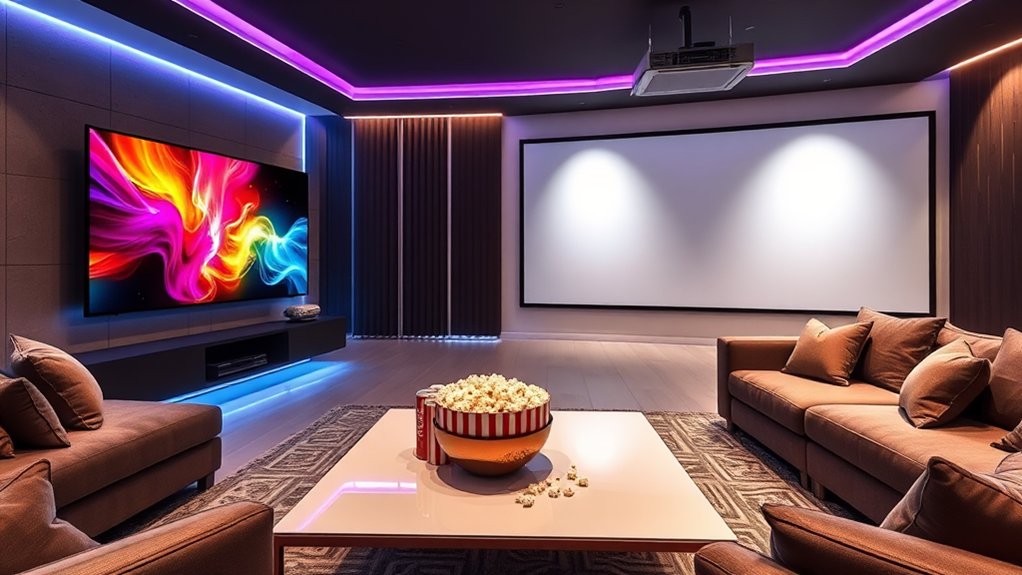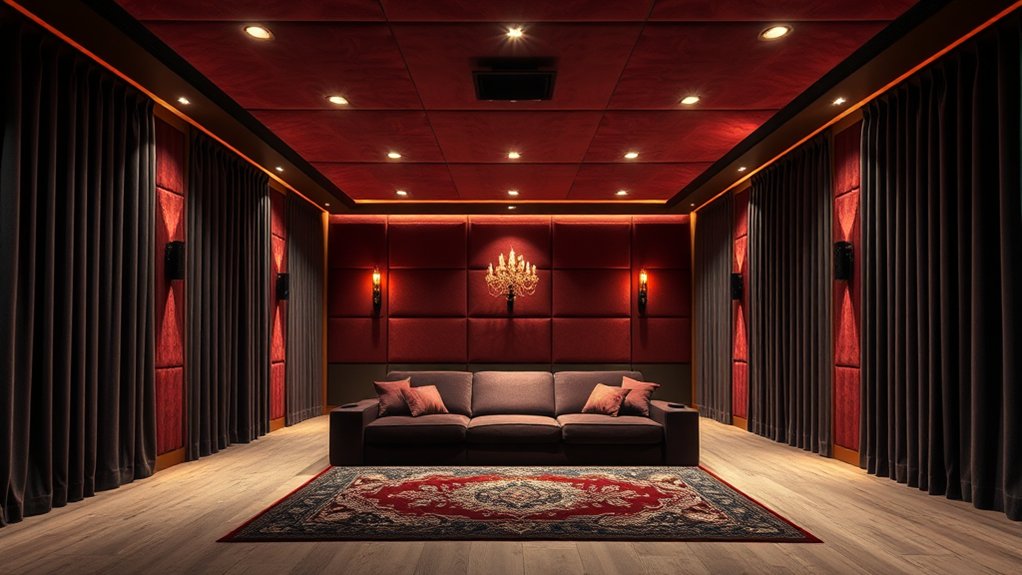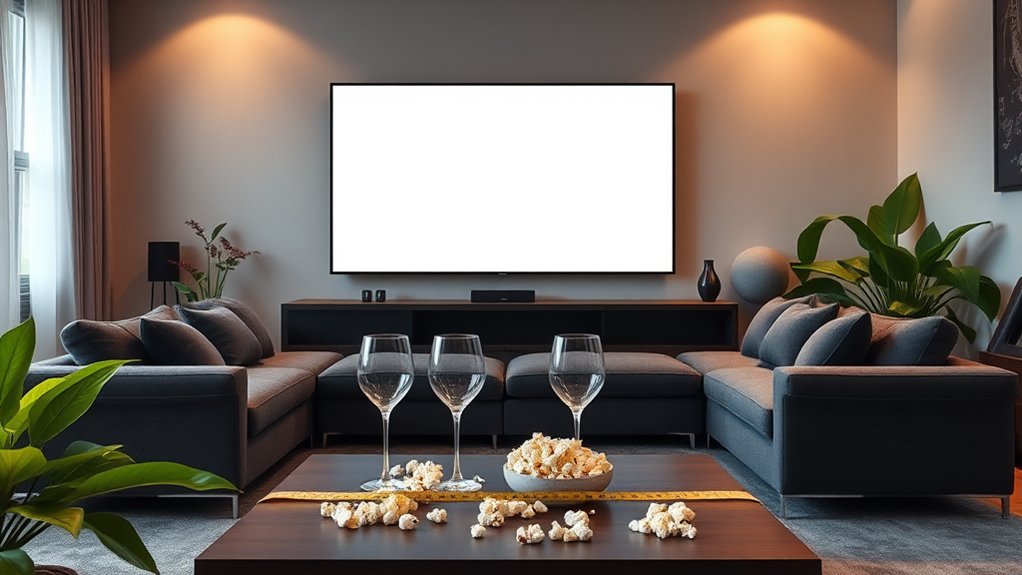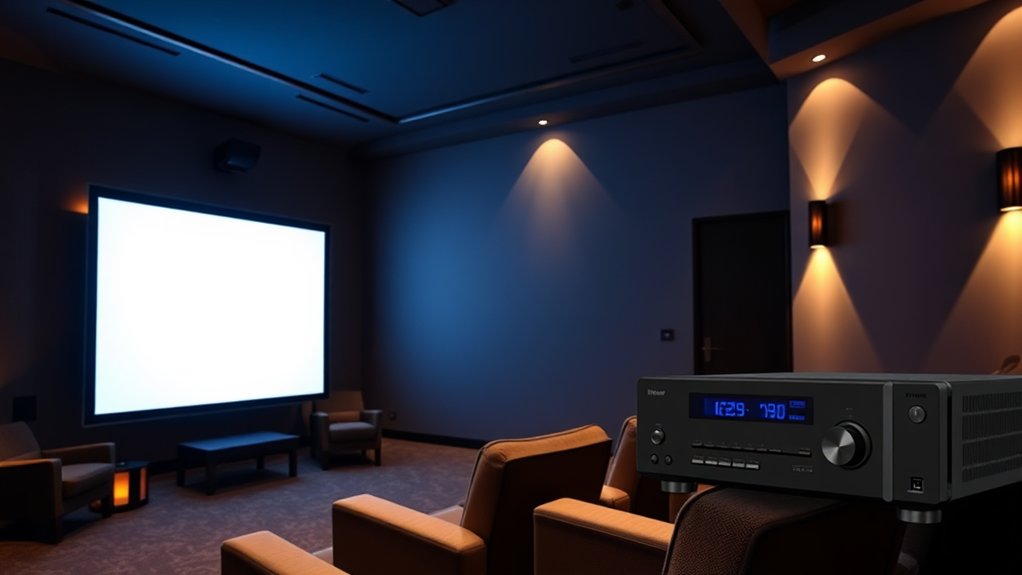Choosing between a TV and a projector for your home cinema really boils down to a few key factors. TVs are great for bright environments and offer easy setup, whereas projectors can create bigger, immersive screens but need a dark room and complex installation. Additionally, consider maintenance needs: TVs typically last longer with minimal upkeep, whereas projectors require bulb replacements. You might ask yourself, “How big is my room?” Well, stick around to reveal more insights that’ll help you decide!
Key Highlights
- Determine your viewing distance and calculate the optimal screen size to create an immersive experience that fits your room layout.
- Consider ambient light conditions; TVs perform better in bright environments, while projectors require darker rooms for optimal image quality.
- Assess your setup preferences; TVs offer easier installation and adaptability, while projectors need precise mounting and may require professional help.
- Evaluate the long-term value, accounting for durability; TVs typically last longer and require less maintenance compared to projectors, which need bulb replacements.
- Factor in all costs, including sound systems and screens; projectors may have lower initial costs per screen inch but could incur higher overall expenses.
Screen Size and Immersion
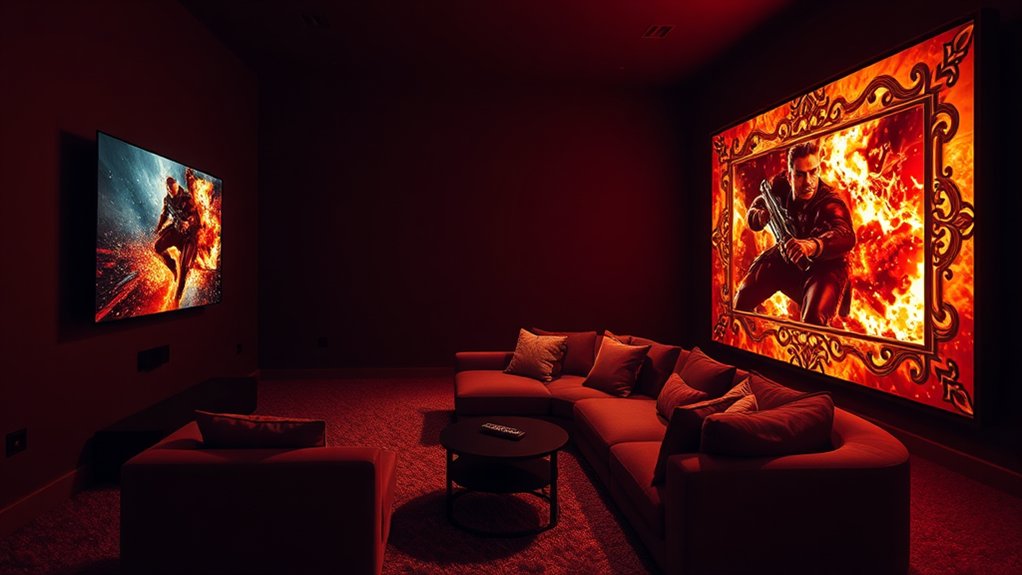
When it pertains to creating an immersive home cinema experience, choosing the right screen size plays a crucial role. You’ll want a screen that fills about a 40° field of vision, making it feel like you’re right in the action. Bigger screen sizes are generally preferred for immersion. For that, a simple calculation helps: take your viewing distance in inches and multiply it by 0.835. Now, if you’re just casually watching TV, a 30° field of view might suffice—multiply by 0.65. Additionally, considering eye capability ensures that viewers can fully appreciate the higher resolutions available in modern displays.
Picture Quality and Brightness Comparison
Selecting your home cinema setup isn’t just about the size of the screen; it likewise hinges on the picture quality and brightness you can expect from your TV or projector.
TVs typically shine in bright environments, boasting brightness levels of 500-1000 nits or more, ensuring vivid visuals even with ambient light. Projectors, in contrast, often have lower brightness, requiring a darkened room to perform their best—who doesn’t love the cozy atmosphere of blackout curtains? Additionally, larger screens provided by projectors create a more immersive viewing experience, which may not be satisfied by an 85-inch TV. Furthermore, TVs are better suited for light rooms, allowing for optimal viewing under various lighting conditions.
Regarding sharpness, TVs deliver consistent clarity across their screens, whereas projectors can struggle with focus, especially at the edges.
Setup Complexity and Installation Requirements
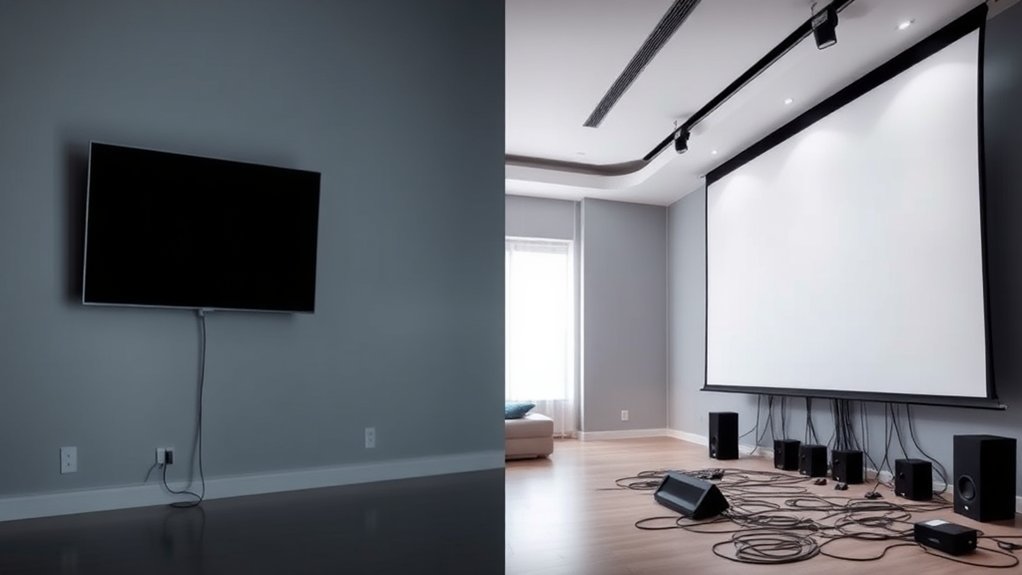
Even though there’s nothing quite like the allure of a large cinematic display in your home, the setup complexity and installation requirements can really tip the scales when weighing your options between a TV and a projector.
A projector needs precise mounting, a clear wall or screen, and sometimes professional help, which can make it feel like you’re preparing for an engineering project. Conversely, TVs are more like that plug-and-play buddy—simple wall-mounting and minimal adjustments needed. Indeed, projectors allow for a grander image, but you’ll have to control ambient light and maintain that image quality over time. Additionally, while setup complexity is a key factor, most TVs are better suited for smaller spaces, making them easier to adapt for various room sizes.
Cost Considerations and Value for Money
As you weigh your options between a projector and a TV for your home cinema, cost considerations will undoubtedly play a significant role in your decision-making process.
Projectors often offer a lower cost per screen inch, making that grand 100-inch display more affordable compared to an equally sized, eye-wateringly expensive TV.
Nevertheless, factor in potential additional costs like a quality projector screen or sound system, and you might find projectors seem pricier upfront.
Consider the added expenses of a quality projector screen or sound system; upfront costs may catch you off guard.
Still, when you zoom out and consider lifespan, maintenance, and potential energy costs, projectors may provide better long-term value. Additionally, investing in high-quality sound quality will enhance your overall cinematic experience and should be part of your budget considerations.
Just remember, you might need to modify your room for those cinematic vibes—wasn’t it just great when you thought a simple couch would do?
Optimizing Room and Lighting Environments
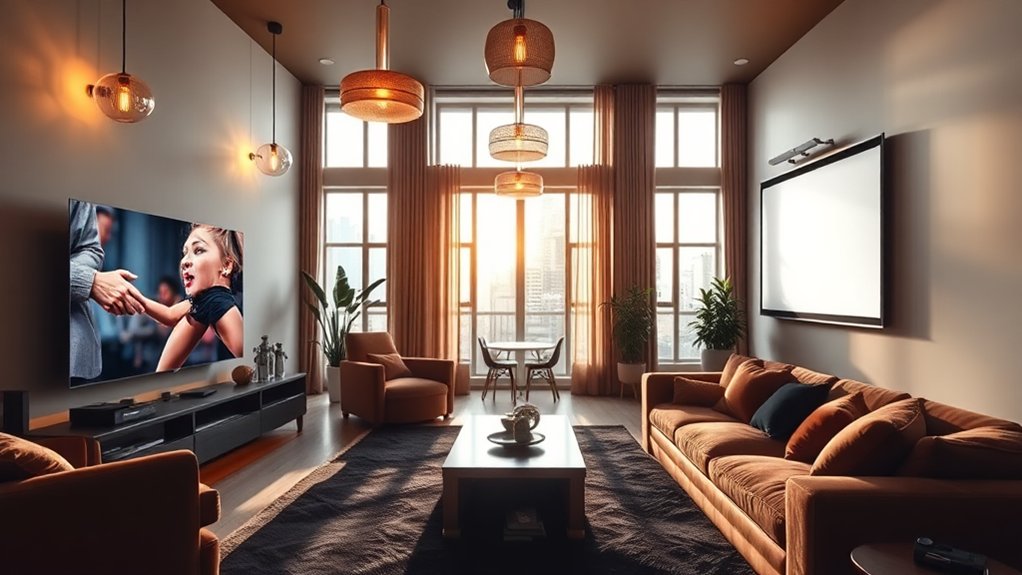
When creating your perfect home cinema, optimizing the room and lighting environment plays a crucial role in elevating your viewing experience, not to mention keeping your guests from feeling like they’re watching a movie in a cave.
Choose a space with minimal ambient light—dark surfaces help reduce reflections and improve contrast. Aim for a ceiling height of at least 9 feet for better sound quality, and use ideal room dimension ratios to avoid problematic acoustics.
Employ blackout curtains to block external light, and consider dimmable lighting for adjusting brightness, ensuring your screen remains the star.
Finally, avoid placing direct lights near the screen since, let’s face it—nobody enjoys watching a blockbuster with glare dancing across the screen, right?
Usage Scenarios and Viewing Habits
How do your viewing habits influence your choice between a TV and a projector for your home cinema?
If you’re someone who loves multitasking—like scrolling through social media during watching your favorite show—a TV might be the better fit, thanks to its ease of use and quick interaction.
Conversely, if you envision immersive movie nights with friends, a projector’s large image size can deliver that cinematic experience you crave.
Older adults, who may prefer focused viewing, often lean toward traditional TVs.
Simultaneously, with streaming now dominating viewing habits, consider how often you switch between platforms and devices: if you’re a frequent channel surfer, a TV will serve you better.
Long-term Maintenance and Durability
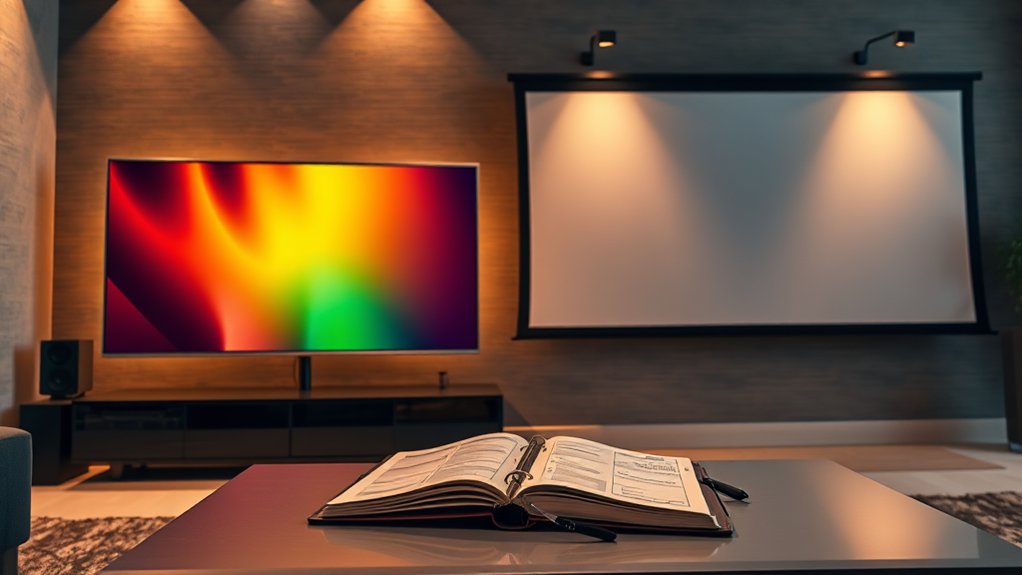
Choosing the right display for your home cinema isn’t just about immediate gratification; it also involves considering long-term maintenance and durability, which can greatly impact your viewing experience down the line.
TVs usually outlast projectors, boasting lifespans of up to 100,000 hours. In contrast, LED TVs require little more than software updates and an occasional dusting.
Projectors often demand regular bulb replacements and filter cleanings, which can be a hassle—and a hit to your wallet. Neglecting these tasks can lead to costly repairs.
Plus, projectors are more sensitive to environmental factors, like dust and heat. So, if you’re after long-term reliability with minimal fuss, a TV might be a better bet—unless you enjoy tinkering with bulbs, of course.
Frequently Asked Questions
Can Projectors Be Used for Gaming?
Yes, you can definitely use projectors for gaming. With advancements in low input lag, high refresh rates, and impressive image quality, they’re becoming a solid choice for immersive gaming experiences, especially in controlled environments.
What Are the Best Screen Materials for Projectors?
You’ll find matte white screens offer great color reproduction, whereas high contrast gray improves blacks. If ambient light’s an issue, consider ambient light rejecting screens. Acoustically transparent options suit setups needing better audio-video alignment. Choose based on needs!
How Do Projectors Compare in Noise Levels to TVS?
Projectors typically produce background noise because of cooling fans, ranging from 25 to 40 dB, whereas TVs operate silently. If you prefer a distraction-free environment, a TV might be a better choice for you.
Is a Projector Suitable for Outdoor Movie Nights?
Yes, a projector’s perfect for outdoor movie nights. It offers large screen sizes, softer light for comfortable viewing, and portability. Just guarantee you have a dark environment and a suitable projection surface for best results.
How Do I Handle Projector Bulb Maintenance?
To handle projector bulb maintenance, turn off and unplug the projector. Allow it to cool before replacing the bulb, checking for compatibility. Regularly clean filters and lens to extend the bulb’s lifespan and guarantee peak performance.

